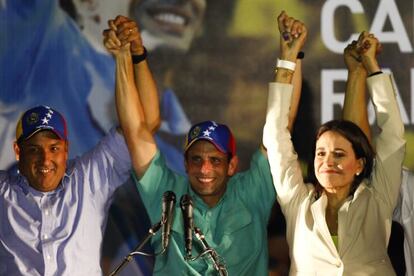Venezuela's opposition comes together to elect Chávez's new rival
Capriles says he is not "a messiah" but wants to end "pharaonic leadership"

Fresh from winning a landslide victory, Venezuelan opposition leader Henrique Capriles Radonski has launched his uphill bid to unseat Hugo Chávez in October's presidential race, with a campaign that is already filled with political and social tensions. The popular 39-year-old governor of Miranda state started his campaign by telling voters that he "isn't a messiah" but instead a public servant."
"We have a lot to do in order to take our message to all the corners of Venezuela so that people can understand what our plans are for health, housing, education, public security and employment," Capriles said during a TV interview shown on Monday.
The governor was elected on Sunday with 64 percent of the votes of the more than three million Venezuelans who participated in the opposition primary. His closest rival, Zulia state governor Pablo Pérez, got 30-percent support.
Although Chávez, who has been in office for 13 years, has been leading in all the opinion polls, political analysts believe that Capriles could give the fiery socialist leader the closest race of his career when the two face off on October 7.
Chávez's self-styled revolution is currently bogged down by soaring crime, high unemployment, food shortages, inflation and rampant public corruption. The 57-year-old has also been dogged by persistent reports that doctors have given him only months to live following his cancer surgery last June in Cuba.
But while he remains popular among the poor and lower-class sectors of the country, Chávez has been able to hold on to power because, among other things, the country's opposition forces have been divided in past races. But this seemed to change on Sunday. Following Capriles' victory, all four candidates who were running in the primary gave each other bear hugs in front of cheering supporters.
This was the first time that the country's opposition forces had agreed to come together under the Democratic Unity Front (MUD) - a coalition of center-left and center-right parties - and hold a nationwide primary to select one contender. Venezuelans living abroad also voted in Spain, the United States and Britain. But whether Capriles will be able to keep the once-fractured opposition together is yet to be seen.
"For the first time, Venezuelans can elect their own candidates, and this has been a victory for the country and democracy," Capriles said.
Capriles began his political career in 1998 - the same year Chávez was first elected - when he was invited to join the congressional slate for the center-right Social Christian (Copei) party. "I have always liked politics, since I was 11 years old. My mother would tell me that when I reached 18 I was going to join a party, but I never did because politics in Venezuela at the time was scorned," Capriles told EL PAÍS.
At 26, he became the youngest speaker of the Chamber of Deputies in the old bicameral Congress. Two years later, he was elected mayor of the fashionable Caracas suburb of Baruta.
Capriles Radonski comes from a prominent family of Jewish immigrants who settled in Venezuela fleeing the Nazi regime. They made their money in construction, banking and the media. The Radonskis used to own the biggest chain of movie theaters in the country.
In 2004, Capriles was held by Venezuela's intelligence officers for four months after he was accused of storming the Cuban Embassy during the brief coup attempt against Chávez two years earlier. Over the past seven years, he has been acquitted on four occasions by 11 different judges.
"I am clear about who my adversary is - it is Chávez, whose tenure must come to an end. It is Chávez and that pharaonic messiah-like leadership that believes it is above all things good and bad."
Tu suscripción se está usando en otro dispositivo
¿Quieres añadir otro usuario a tu suscripción?
Si continúas leyendo en este dispositivo, no se podrá leer en el otro.
FlechaTu suscripción se está usando en otro dispositivo y solo puedes acceder a EL PAÍS desde un dispositivo a la vez.
Si quieres compartir tu cuenta, cambia tu suscripción a la modalidad Premium, así podrás añadir otro usuario. Cada uno accederá con su propia cuenta de email, lo que os permitirá personalizar vuestra experiencia en EL PAÍS.
¿Tienes una suscripción de empresa? Accede aquí para contratar más cuentas.
En el caso de no saber quién está usando tu cuenta, te recomendamos cambiar tu contraseña aquí.
Si decides continuar compartiendo tu cuenta, este mensaje se mostrará en tu dispositivo y en el de la otra persona que está usando tu cuenta de forma indefinida, afectando a tu experiencia de lectura. Puedes consultar aquí los términos y condiciones de la suscripción digital.








































